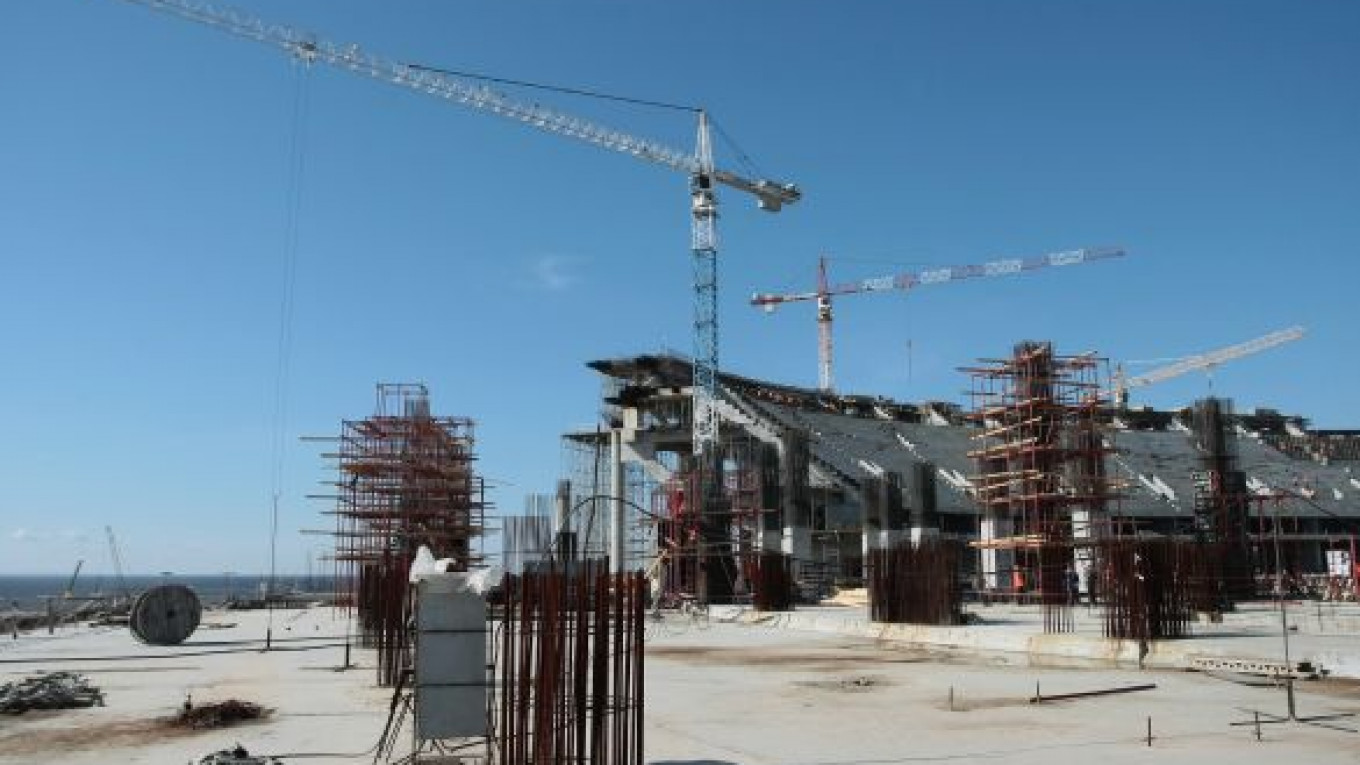The sports ministry may gain oversight responsibility for the construction of football stadiums for the World Cup in 2018, with the right to commission work without going through a tendering process, according to a proposal submitted to Prime Minister Dmitry Medvedev.
Medvedev has authorized the creation of an interagency commission, which by Nov. 1 should draw up plans for the construction of football stadiums in the regions, Kommersant reported Friday.
According to preliminary proposals submitted to the prime minister, the ministry is slated to become the single government agency in charge of building the sports infrastructure for the tournament, federal officials said.
The ministry will be made responsible for distributing about 100 billion rubles ($3.2 billion) of state funds to build seven arenas in Volgograd, Yekaterinburg, Nizhny Novgorod, Kaliningrad, Samara, Saransk and Rostov-on-Don. Each stadium will cost about 13.5 billion to 14 billion rubles.
Earlier this year, the Finance Ministry insisted on making local authorities in the regions where World Cup matches will be played responsible for building the infrastructure, but now the authorities want to see a single organization responsible for the construction, a source said.
The sports ministry is a natural candidate for the role because its subsidiary organization, Sports Engineering, has already designed seven sports arenas, the source said.
Meanwhile, the authorities are not going to put control for all construction related to the World Cup in the hands of one company, as was the case with Olympstroi, which is responsible for all facilities and infrastructure for the Winter Olympic Games in Sochi next year, another official said.
The sports ministry and the office of Deputy Prime Minister Igor Shuvalov, who is responsible for the preparation for the World Cup, declined to comment.
The total amount of funds needed for the preparation for the World Cup finals in 2018 is 664 billion rubles. Of that amount, the government plans to spend 175 billion rubles on the construction and modernization of 12 stadiums in 11 cities, 121 billion rubles of which will come from the state budget.
In addition to already existing stadiums in Moscow, St. Petersburg and Kazan, the ministry will need to build seven new stadiums in the regions, an official said.
Given the shortage of time, the ministry may resort to making contracts with general contractors at fixed prices without going through a tendering process.
"Conducting tenders to choose contractors takes a lot of time, which we do not have," an official said, noting that the law foresees waiving the tendering process for building particularly important facilities.
Construction company Mostotrest, controlled by billionaire Arkady Rotenberg, said it might consider participating in stadium construction even though building sports venues is not among its specializations. Business structures controlled by another tycoon, Gennady Timchenko, are also interested in the construction of stadiums for the World Cup, a representative of the Volga Group company said.
Contact the author at bizreporter@imedia.ru
A Message from The Moscow Times:
Dear readers,
We are facing unprecedented challenges. Russia's Prosecutor General's Office has designated The Moscow Times as an "undesirable" organization, criminalizing our work and putting our staff at risk of prosecution. This follows our earlier unjust labeling as a "foreign agent."
These actions are direct attempts to silence independent journalism in Russia. The authorities claim our work "discredits the decisions of the Russian leadership." We see things differently: we strive to provide accurate, unbiased reporting on Russia.
We, the journalists of The Moscow Times, refuse to be silenced. But to continue our work, we need your help.
Your support, no matter how small, makes a world of difference. If you can, please support us monthly starting from just $2. It's quick to set up, and every contribution makes a significant impact.
By supporting The Moscow Times, you're defending open, independent journalism in the face of repression. Thank you for standing with us.
Remind me later.






